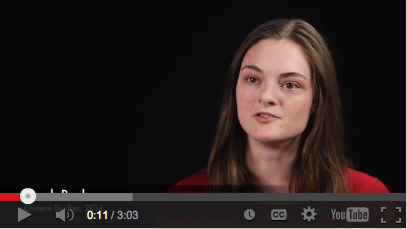Colleen Mulrooney (’19), Major in Chinese Language & Culture
I came to the College of William & Mary with one simple hope—well, one among a few others, but the most important one was gaining a deeper understanding of China. I had been learning Chinese since age 13 and felt really ready to just declare a Chinese major as soon as I could. William & Mary was actually my first choice school becausethe Chinese department looked so strong.
By the time I actually got around to declaring that long-awaited Chinese major my sophomore year, my major advisor, Dr. Calvin Hui, joked that I had already taken so many courses in the Chinese department that I might as well declare two Chinese majors. It was completely accurate. The Chinese Department courses were great and engaging because there are so many parts of China to be seen. In my time here, I took both Chinese freshman seminars, Modern Chinese Literature, Chinese Pop Culture, Calligraphy, Chinese Cinema, the Senior Capstone Seminar, and every Chinese language class from Chinese 301 through 404. Then in these classes, the topics I got to research and write about ranged from Japanese colonialism in Taiwan, to Chinese memes, to my senior research paper about counterfeit products featuring the British cartoon Peppa Pig, and how these products made a mark on modern Chinese society. Sometimes, it did not even feel like homework.
Better yet was how practical it all was. When I studied in Taiwan, there were actually several instances where material I had learned about in class was brought up. A teacher on my study abroad program actually brought up a Lu Xun short story I had read in Modern Chinese Literature. Other friends there would talk about some of the films and TV shows I watched for the freshman seminar and Chinese Cinema classes. So much of what I learned in class has been really helpful in that very practical study abroad setting, and it will absolutely continue to help me in years to come.
Most important, however, was the supportiveness of the Chinese program. The professors were always willing and ready to help my classmates and I to achieve whatever we were aiming for. From winning the Jiangsu Cup Chinese Speech Contest as a Freshman, to getting a Critical Language Scholarship to study in Taiwan, and finally now, receiving a Fulbright English Teaching Assistantship in Taiwan for this coming academic year, the professors at the Chinese Department have supported me every step of the way. Whenever I needed extra practice before a speech contest, or a recommendation, or even just advice, they were always there to help. This, in turn, inspired me to work as hard as I could.
I have nothing but gratitude for my time studying with the William & Mary Chinese Department, and I am not even sure what to say leaving it. It is a really bittersweet feeling. I am looking forward to the coming year, but I will miss dearly those who helped me get to it.
后会有期。


















